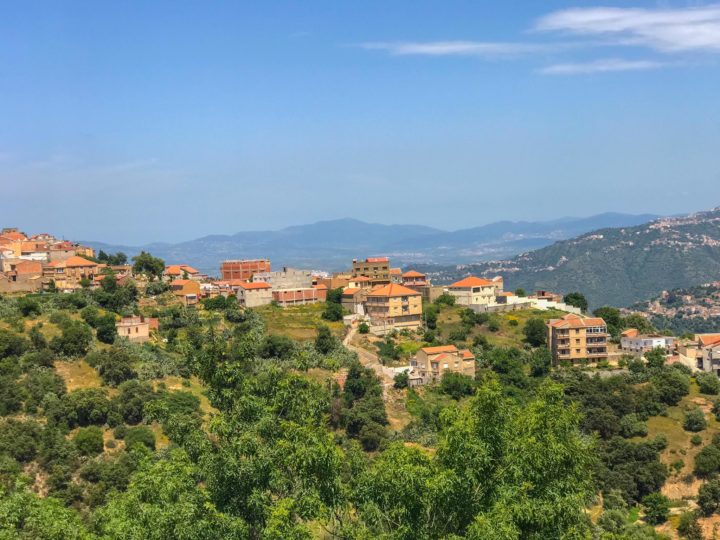Kabylia is a mountainous region in North Africa. Its inhabitants call it in Kabyle “Tamurt Idurar” (Country of the Mountains) or “Tamurt Leqvayel” (Country of the Kabyles). It is part of the Atlas Mountains and is located by the Mediterranean Sea. Kabylia has seven administrative divisions: Tizi ouzou, Bejaia (Bgayet), Buira (Tubirett), Bordj Bou Arreridj, Jijel, Boumerdes and Sétif. It occupies a very special place in the whole of the contemporary Berber world. The importance and dynamism of its elites, its decisive role in the emergence of contemporary Berber consciousness and claims make it in all respects a key region of the Berber world.
By Rabah Arkam
Current and future trends in Kabylia will undoubtedly be decisive for the future and the very survival of Berber identity.It is inhabited by a dynamic and peaceful population which makes liberty the most sacred value of its existence. Land of all aspirations, it has seen many invaders.
Kabylia has a unique and characteristic culture, language, legal system, and history. Most of the Kabyle population is strongly anchored in the environment and attached to its land and its traditional territory. It has often, for generations, been stalked and subjugated, a victim of destruction of their culture, discrimination and widespread violations of their human rights. For centuries, it has suffered from the non-recognition of its political and cultural institutions, and the integrity of its culture has been undermined.
It has been supported by the persistence of the anti-Kabyle policy of the Algerian regime on a stigmatized population, and subjected to particularly violent state policies.
The principle of all sovereignty resides essentially in “The Nation”, and yet after independence in 1962, Kabylia is misled by a pseudo-sovereignty that it thinks it holds precisely because it is “The State”.
Kabylia has remained a region apart, before and after, and always considered a rebel region, before and after historical events: opposed to the Romans, the Arabs, the Turks and then the French. In the fight against the colonizer, they hoped in return for recognition of their specificity within the Algerian nation. Socialist Algeria did not recognize their language, their culture, or even really the role played by their leaders in the war for the independence of Algeria. The Kabyles were marginalized in the upper echelons of the new power and successive presidents, Ahmed Ben Bella, Houari Boumediene, Bouteflika as well as Teboune today, guided by the generals of the Oujda clan, who continue to Arabize and Islamize this population.
All the error is there. An error maintained by the international community which sees States through the definition given by international law, leading to an obvious confusion between the State it recognizes, a collective of souls and an empty shell, without soul since without nation and therefore a land where democracy, failing to serve a nation, serves a handful of individuals constituted as a state.
Indeed, only belonging to a “nation” generates awareness of a national identity opposable to the State and its hegemony. This is the reason why the Algerian state, not having built nations, continues to dominate the peoples who, not constituted as nations, are ethnically divided.
In addition, Kabylia has suffered the adverse effects of development processes, which seriously threaten its existence. The free, prior and informed consent of the Kabyle people on issues affecting their lands, ancestral territory and natural resources was considered an essential condition for the realization of their right to self-determination, the preservation of their identity, their specific culture and language, reaffirmed by Article 3 of the United Nations Declaration.
Noting that the Charter of the United Nations, the International Covenant on Economic, Social and Cultural Rights and the International Covenant on Civil and Political Rights, as well as the Vienna Declaration and Program of Action, affirm the fundamental importance of the law of all peoples to self-determination, a right by virtue of which they freely determine their political status and freely ensure their economic, social and cultural development.
Aware that nothing in this declaration can be invoked to deny a people whatever its right to self-determination, exercised in accordance with international law.
The Kabyle people frequently face marginalization and legal discrimination in their country, which makes them particularly vulnerable to human rights violations. Those who defend the rights of the Kabyle people face intimidation and violence, often supported by the Algerian regime.
Confronted with the protests of the Hirak (Arabic word meaning etymologically “movement”) in Algeria against the government, the Algerian government exploited this apparent difference between the regions: in addition to banning the Berber flag, the regime has also spread numerous rumors, accusing it of manipulating the protest. “The anti-revolutionary campaign uses Kabylia as an excuse”.
The pursuit of Arabity had as a corollary Islamity. The Algerian authorities have always relied on an Arabization policy because it enshrines the legitimacy of the State of which Islam was the depositary. Religion was thus used as an instrument to contain a possible progression of secular and democratic movements.
At the same time, the Algerian government has favored extremist Islamist movements and allowed them to increase their political influence to the point of threatening the existence of the Kabyle people, victims of Arabism and Islamism, which are nothing but masks of hypocrisy.
This fight is that of truth against lies, of nonviolence against violence, of democracy against an authoritarian regime, justice against injustice, and deprivation of liberty. Nonviolent resistance is here the privileged means of struggle in favor of human rights. Its general purpose is to work for more justice and freedom.












